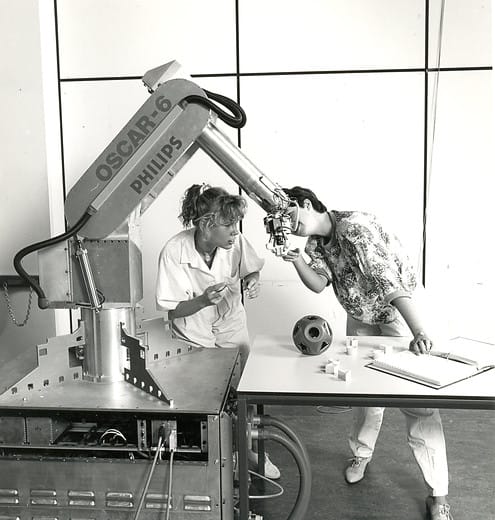Resistance to Change

In 2023, Artificial Intelligence will be the topic that defines the year. Proponents of the technology argue that it will change our lives radically, and if we believe all of the hype and hope it will bring about a revolution to rival the original industrial revolution that kick-started our explosive technological and societal improvements. Elsewhere in this issue, Erjan has written a more nuanced commentary on the efficacy and implications of this technology outlining the truths and myths of what AI can do.
The introduction of this new technology also exposes an issue that everyone is likely to run into at some point in their professional careers: people tend to resist change. As engineers, we are always looking for ways to optimize the world that we see around us. It can be tempting to dive headlong into picking apart each and every process in an organization in a desperate bid to unlock the full potential of the resources available to the organization. However, sooner or later you will find yourself burnt out with no progress to show for your enthusiasm and hubris. It almost seems as if the more you try to convince the people around you to change, the more you find they refuse to budge. You are Syssiphus, and they are your rock.
It is simple to put the blame on the people that are resisting the change. To say that they are unwilling or unable to change with the times. Even in the scientific literature concerning change management, we considered the resistance to change an “irrational and dysfunctional response” [1] for a long time. However, more recent research has shown that resistance to change is much more than a one-sided unwillingness to cooperate and instead is something that is influenced heavily by the actions of the change initiator as much as the actions of the change recipient.
Let’s dive deeper into the factors that govern resistance to change and perhaps discover how we can foster cooperation rather than confrontation.
Expectations matter
We have established that the classic understanding of resistance to change is flawed. While it is easier to blame only the recipient of change, it is important to understand our role as change initiators. A review of decades of scientific research into change found that managing expectations, providing strong reasoning, and preserving the agency of change recipients were critical factors in the success of a change process [1]. In other words, people tend not to like feeling misled or without control over their situation. Other researchers have found that the idea of losing power, status, money or comfort due to a change is what causes us to cling to the status quo [2].
Another factor that we have glossed over so far in this article is the name of the phenomenon we are describing. Perhaps the biggest contributor to resistance is the expectation that we will meet resistance. Resistance to change may be an example of a self-fulfilling prophecy that we are perpetuating by framing our thinking of the phenomenon in light of resistance. Naturally, where we expect resistance we will act in such a way that we can protect ourselves and our ideas from this resistance. In turn, by becoming protective of our ideas we invite resistance by seeming unwilling to consider alternative options or opinions.
Finally, previous resistance will drive new resistance. When previous attempts at change have failed due to communications breaking down over mismanaged expectations or an attempt to push through a change that violated the agency of the recipient, new changes will be met with more scepticism and are less likely to succeed. This can lead to a cycle of resistance that can only be broken through conscious effort.

Resistance as a driving force
Luckily for us, resistance to change is not all doom and gloom. In fact, there is evidence that resistance is beneficial to the process of change overall.
One positive aspect of resistance is engagement with an idea. By generating more discussions focused on the change, more people will be exposed to the idea more often. These discussions can be leveraged to understand the reasons why resistance exists in the first place. The same people that will resist a change are often the ones that will advocate a change once they understand and support the initiative.
Also, like how previous resistance to change will prevent a new change, a change that has been challenged and consequently accepted is more resistant to reversal. The inoculation against change that comes from resistance also cements a change in an organization in the cases that they succeed.
“All changes, even the most longed for, have their melancholy; for what we leave behind us is a part of ourselves; we must die to one life before we can enter another” - Anatole France, 2016
Dealing with resistance
Now that we have established that resistance can be a constructive tool in the change process, how do we use it as such?
First, we need to understand that resistance often does not stem from an unwillingness to change. Instead, factors such as previous experiences, misunderstanding the change, missing agency or fearing loss are likely to drive resistance. Instead of trying to prevent resistance, use the resistance to drive discussions and expose the plan to new ideas that you may not have considered.
Most change management techniques focus on the reduction of resistance by adversarial techniques. The idea is that we can create understanding and therefore acceptance in change recipients by means of “information ‘battering’” [3]. Instead, we may find more success with a more open-ended approach such as a Q&A session with the change recipients. So far, there is no clear-cut best practice for engaging people in such an open-ended conversation. In reality you will often have to carve your own path and find what works best for the situation at hand.
Conclusion
In short, resistance to change is a phenomenon that suffers from a poorly chosen name and unfair expectations. In theory, we would expect a positive change to be accepted with open arms. However, reality is messy and people are emotional beings. Resistance is a given that we can use to our advantage to test our ideas, find people who are invested in the change, and ensure that the change sticks once implemented.
Resistance is inevitable, do not fear the resistance.





